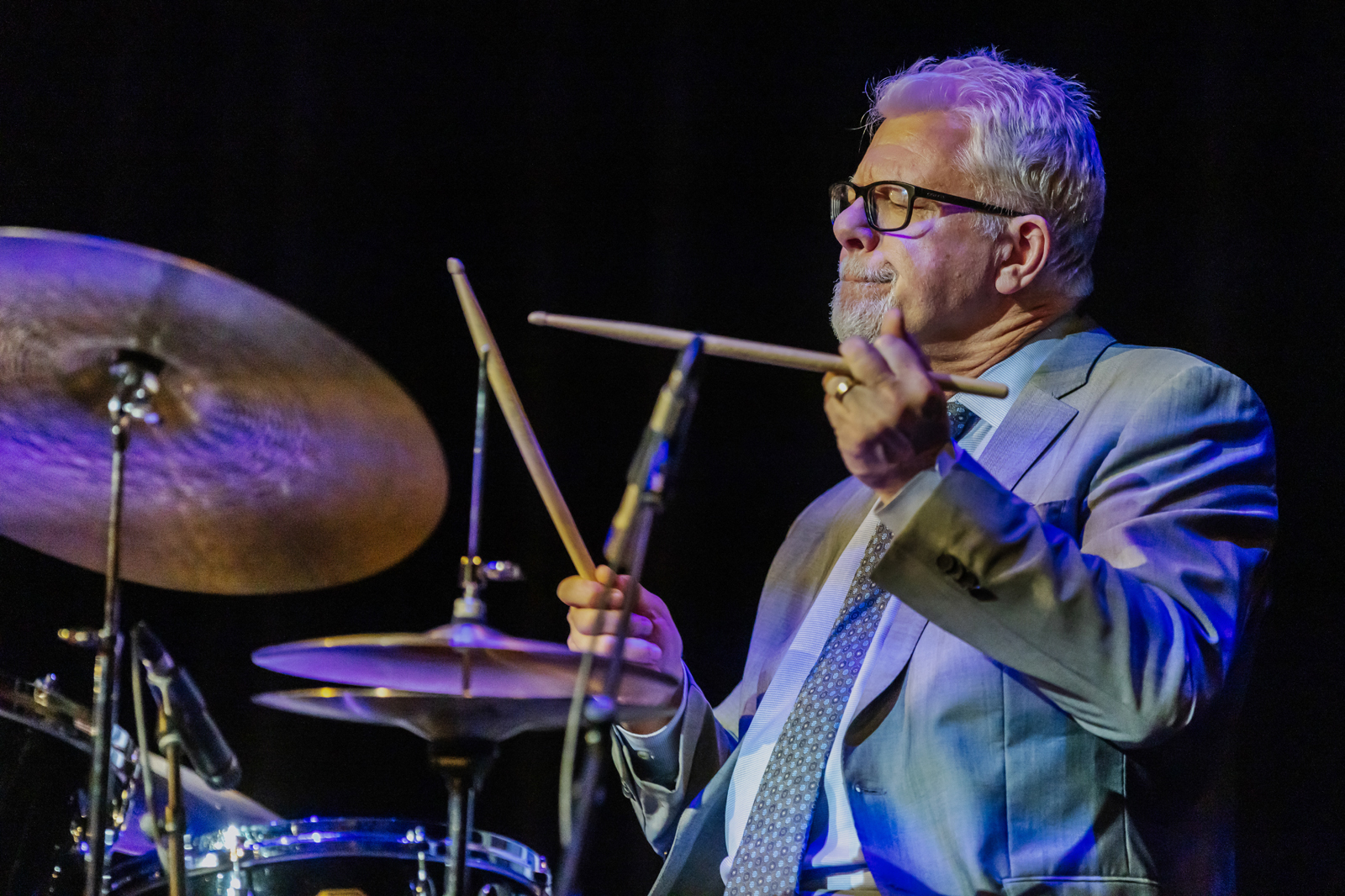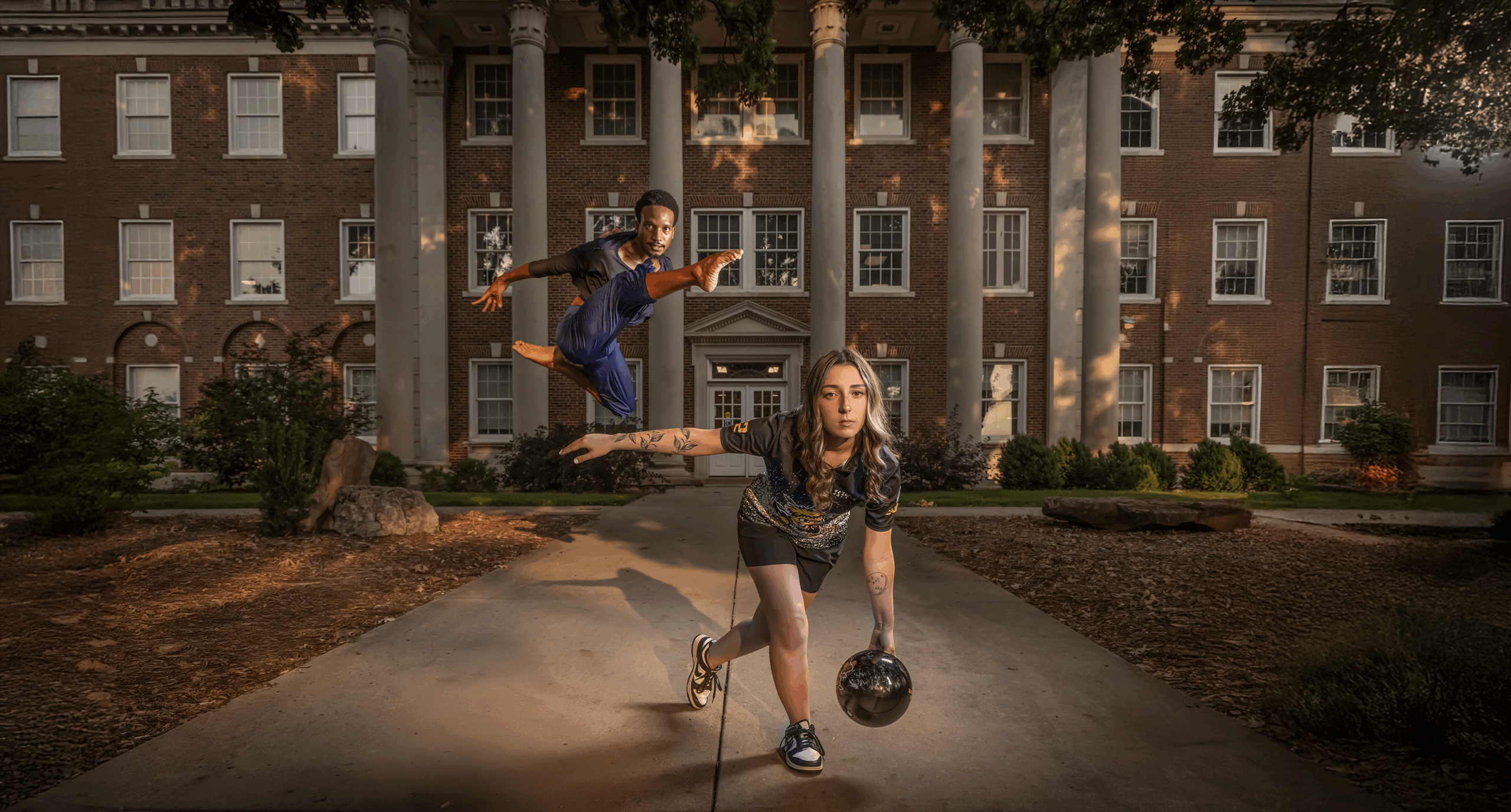The Extra Mile

By Emily Mullins ’17/20
Zoe Thompson met WSU physical therapy pros in 2023. Since then, it’s been strides forward for both.
“We always say, ‘walk ugly, walk often,’” says Audrey Garcia, a physical therapy clinical faculty member at Wichita State, as her hands gently and steadily guide 8-year-old Zoe Thompson through the playground of Argonia Elementary School.
It was the summer of 2024, and Zoe scowled with determination as she inched her walker through the mulch, aiming her feet to stomp on Garcia’s toes as she swung them forward one step at a time, making her way to a group of students examining a bug on the ground. Her fierce focus was only broken when she caught sight of the camera, which she unabashedly grinned at with a goofy, mischievous smile.
“That epitomizes her spirit,” says Dan Thompson, her dad. “She’s always interested in doing what everyone else is doing. She wants to go off the diving board and down the slide. She wants to get on the bus with everyone else and go ice skating. If she can figure out a way to do it, she’s going to do it.”
Zoe’s quick smiles and independence could easily convince you that her cerebral palsy is just a minor inconvenience to her. Unfortunately, that assumption isn’t quite true. Zoe has dealt with CP her entire life, and while she doesn’t let it stop her, the spasticity it causes in her legs makes walking highly painful and physically exhausting.
The symptoms of cerebral palsy vary from person to person, and while there is no cure, there are many ways treatment and therapy can help those affected. In Zoe’s case, this includes a selective dorsal rhizotomy surgery that involves cutting specific nerve roots in the spinal cord to reduce the muscle tightness in her legs. The surgery would ideally help her walk without pain or the need for assistive equipment. While it’s considered minimally invasive, the recovery is anything but, even for a determinedly resilient girl like Zoe.
Zoe’s parents, Dan and Shawn Thompson, were pursuing the opportunity in 2023 for her to have the surgery, but due to the lack of access to physical therapy after the procedure, they were stalled out. “The success of that surgery is directly linked to the physical therapy and rehab that happens afterwards,” Dan says. “If you don’t have somebody who understands that process and what you’re trying to accomplish, the surgery won’t have the outcomes it could have.”
Shawn and Dan looked everywhere for the services they needed to ensure Zoe could get the care required to have the surgery, but in Argonia, Kansas, a town of fewer than 500 people, those services seemed out of reach. “Most parents will do anything for their kids to give them the best life you can, and when you have a kid with special needs, it can feel like there’s a whole other extra mile, extra hurdle, extra fight you have to go through to do that,” says Shawn. “You’ll have crazy ideas like, well, ‘If the therapy is in Colorado, I guess we’ll move to Colorado,’ because that’s a whole lot easier than trying to find someone local.”
Little did they know, the help they needed was about to come walking right through their front door.
A partnership in motion
In fall 2023, M’Lisa Shelden, chair of WSU’s physical therapy department, received a phone call that would shape the future of her work. On the other end of the line was Amanda Lowrance, director of the Sumner County Educational Services Interlocal 619. Lowrance was in a predicament. The school year was well underway and Argonia Elementary no longer had access to a physical therapist to work with Zoe. This was a problem not only for Zoe but because per the Individuals with Disabilities Education Act, schools must provide access to care that meets the unique needs of a child via an individualized education program (IEP). For small schools, finding licensed professionals to fulfill these IEPs is too often a challenge.
Interlocal 619 was set up in 1985 to address that challenge. It uses pooled resources of six school districts to hire or contract for services needed. When Lowrance was unable to find a physical therapist for the remainder of the 2023-24 school year, she decided to get creative, and her creativity paid off. That first phone call to Shelden set in motion a partnership that quickly grew to support upwards of 40 students across all six interlocal districts, while providing hands-on applied learning opportunities for WSU physical therapy students.
“This partnership is important for Kansas communities because of a shortage of physical therapists across the state, especially in the educational setting,” says Lowrance. “Not only is WSU providing services students need, they’re also showing PT students what the educational setting looks like, giving them the opportunity to fall in love with it and decide they can make a difference.”
Shortly after the two spoke on the phone, Shelden met with the Thompson family to discuss what support Zoe needed. When she heard about the surgery they were pursuing, she thought of Jennifer James, an assistant professor in the PT department and a board certified pediatric clinical specialist who had the expertise needed to provide intensive therapy post-surgery.
Shelden posed a question to the family: “What if we could provide the support Zoe needs at school and at home after her surgery, and we could also do a case study of this experience?” She recalls, “Zoe and her family were the primary focus in my mind, but I was also thinking about this as an experience that many pediatric physical therapists go their whole careers without having. We have three new, highly skilled, very intelligent, hardworking PTs who could have the opportunity to do the research, support and development, and then look at the outcomes right at the beginning of their careers.”
To Shawn and Dan, the offer was an answer to their prayers, so Shelden and James got straight to work.
A path forward
In September 2024, after more than a year of intensive physical therapy from WSU’s team, Zoe and her parents traveled to Houston, Texas, and a successful selective dorsal rhizotomy surgery was completed. In the months since, Zoe has increased her muscle control, strength and speech, and with Garcia and James providing ongoing post-surgery rehab, she is gaining independence by the day.

Much of the work Zoe’s PT team is doing falls within the realm of rehabilitation medicine, a specialty encompassing work that improves function and minimizes impairment caused or affected by disease, injuries or developmental disorders.
At Wichita State, a key part of rehabilitation medicine focuses on the development and implementation of assistive technology — and the university is taking steps to increase these efforts through the newly established Institute for Rehabilitation Medicine and Assistive Technology.
“IRMAT is the brainchild of Dr. Gregory Hand and conversations about partnerships that already exist within the university,” says Shelden, referring to the dean of the WSU College of Health Professions. “For example, physical therapy and the College of Engineering do some exciting things together now, but there’s sort of a narrow scope. PT also has a working partnership with Communication Sciences and Disorders, but again, it’s a narrow focus. Dr. Hand’s idea was to create an institute that focuses not only on service but on research and development.”
Comprised of collaborators from WSU’s departments of engineering, physical therapy and CSD, including the Evelyn Hendren Cassat Speech-Language-Hearing Clinic, IRMAT is a fluidly structured network of clinicians, researchers, educators, students and other partners who work together to develop and study treatment strategies and technologies designed to help ease the challenges of those living with disease and disabilities.
Now housed in department locations on and off WSU’s main campus, the institute will move to the Wichita Biomedical Campus in 2027, when its new home will feature state-of-the-art research labs, classrooms and clinical space.
IRMAT’s centralized location will further collaboration for work with kids like Zoe, whose CP has also caused delayed speech development. The support WSU provides will go beyond access to therapists and current assistive technology. It will set up opportunities for students to explore customized assistive technology and build new equipment for individual cases.
“This is important, for more reasons than just Zoe’s success,” says Dan. “To have Wichita State willing to do more, wanting to do more, and pushing for more education to train better physical therapists, speech therapists – all of it.
“There are a lot of people who will benefit.”
SEE MORE OF ZOE’S STORY

“Our mission at the Institute for Rehabilitation Medicine and Assistive Technology is to accelerate discovery in applied healthcare research, actively develop new assistive technology and devices, and mentor future leaders in an environment of collaboration. We’re all about science that changes lives and improves health outcomes for people of all ages – including Zoe and her family.”
GREGORY HAND
Dean, WSU College of Health Professions



